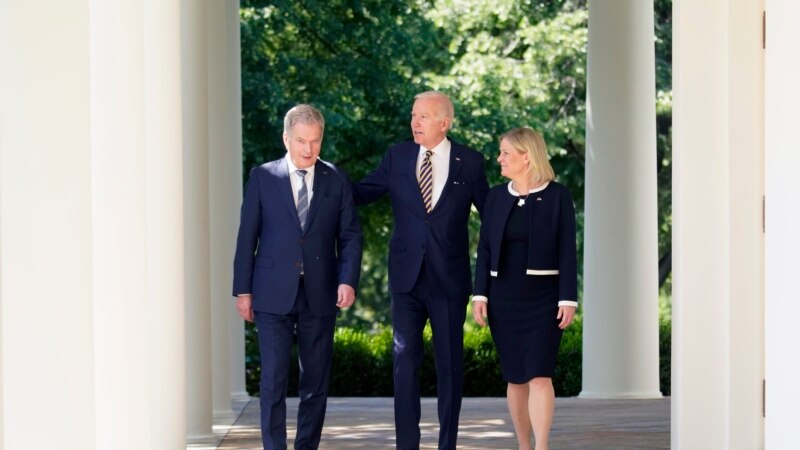
U.S. President Joe Biden on Thursday enthusiastically welcomed Sweden’s and Finland’s bids to join the NATO security alliance — moves that would enlarge the bloc to include two of Europe’s most modern militaries and place it along Russia’s northwestern border.
Speaking from the Rose Garden while flanked by Prime Minister Magdalena Andersson of Sweden and President Sauli Niinistö of Finland, Biden said he would send their membership applications to the U.S. Congress, where he hopes for a swift approval.
“Sweden and Finland have strong democratic institutions, strong militaries, and strong and transparent economies,” Biden said. “And a strong moral sense of what is right. They meet every NATO requirement, and then some.”
NATO Secretary-General Jens Stoltenberg made the announcement about Sweden and Finland on Wednesday at the alliance headquarters in Brussels. The 29 other NATO members will have to agree by consensus to admit the two nations—a process that normally takes up to a year but is expected to be faster in this case.
Finland’s and Sweden’s applications mark a significant departure from their decades-long neutrality, dating from the Cold War. Moscow’s decision to invade neighboring Ukraine on February 24 raised fears in both countries, especially in Finland, which shares a border with Russia of more than 1,300 kilometers.
Kurt Volker, the former U.S. ambassador to NATO, told VOA that the security alliance could soon see even more membership bids.
“If Finland and Sweden, which are democracies, EU members, powerful militaries — if they don’t think that it is safe to be outside of NATO, then clearly the countries that have been left out until now, the ‘gray-zone countries,’ if you will — Ukraine, Georgia, Moldova, some of the Balkans — they cannot possibly consider themselves safe without NATO either,” he told VOA. “So it’s going to increase that demand.”
At a Wednesday meeting at the Pentagon, U.S. Defense Secretary Lloyd Austin told his Swedish counterpart, Peter Hultqvist, “We look forward to your contributions to the NATO alliance.”
“This is a time when the democracies of Europe and North America must stand together against Russia’s naked aggression,” Hultqvist said.
Only NATO ally Turkey has expressed reservations about the Baltic neighbors joining the alliance, with Turkish President Recep Tayyip Erdogan accusing them of giving a haven to “terrorists” and imposing sanctions on Turkey.
“We asked for 30 terrorists to be extradited, but [Sweden] said they wouldn’t,” he said this week. “You will not hand over terrorists to us, but you will ask us to allow you to join NATO. NATO is a security entity. It is a security agency. Therefore, we cannot say ‘yes’ to depriving this security organization of security.”
Ankara says Sweden and Finland have harbored people it says are linked to groups it deems terrorists, namely Kurdistan Workers’ Party (PKK) militants and followers of U.S.-based Fethullah Gulen, whom Turkey accuses of orchestrating a 2016 coup attempt.
Erdogan has also said Turkey would oppose NATO bids from those who imposed sanctions on Ankara. Sweden and Finland had banned arms exports to Turkey after its Syria incursion against the Kurdish People’s Protection Units — PKK’s Syrian affiliate—in 2019.
On Thursday in Washington, Finland’s Niinisto said his government has had discussions with Turkey and gave assurances that they would be good NATO allies.
“As NATO allies, we will commit to Turkey’s security, just as Turkey will commit to our security,” he said. “We take terrorism seriously. We condemn terrorism in all its forms and we are actively engaged in combating it. We are open to discussing all the concerns Turkey may have concerning our membership in an open and constructive manner.”
But analysts say this move could further provoke Russia.
“I do worry that the expansion of NATO to add Finland and Sweden is provocative,” Melanie Sisson, a fellow at the Brookings Institution, told VOA via Zoom. “And I worry that, whatever one’s view about the value of having them in the alliance, I’m not sure that working that issue right now is wise and actually, I think, shows some lack of strategic patience. So I worry about that dynamic potentially causing a different reaction from Russia than we otherwise would see.”
Russian President Vladimir Putin has described NATO’s eastward expansion as a threat to Russia, and cited Ukraine’s desire to join the alliance as a reason for his decision to invade in February.
“The expansion of NATO — this is a problem that is created completely artificially, because it is done in the foreign policy interests of the United States,” Putin said this week. “In general, NATO has become a foreign policy instrument of one country.”
Later Thursday, Biden departed for his first presidential trip to Asia, where he will visit U.S. allies South Korea and Japan and attend a summit of Quad leaders. Those meetings are likely to also feature lengthy discussions on the situation in Ukraine.
VOA Pentagon Correspondent Carla Babb and Milena Durdic contributed to this report. Some information came from Reuters.
